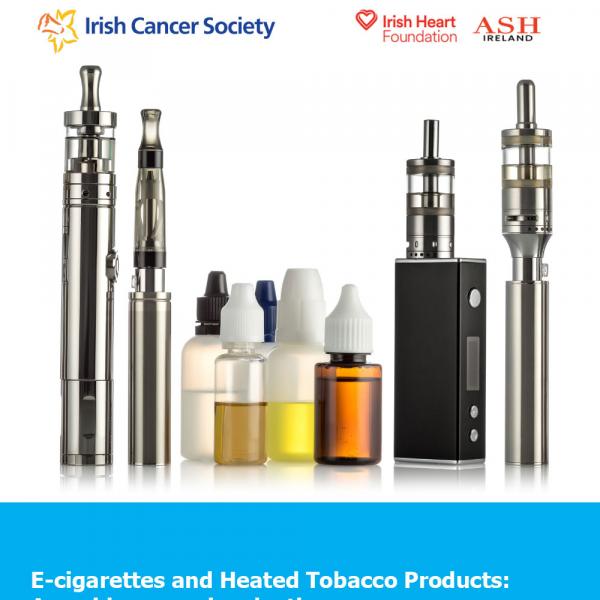Irish Cancer Society position on e-cigarettes

What are e-cigarettes?
An e-cigarette is a device which vaporises and delivers a chemical mixture known as an “e-liquid” to the lungs in the form of an aerosol.
E-Liquids are typically composed of nicotine, propylene glycol and other chemicals.
All e-cigarettes comprise of a lithium battery, a cartridge containing the e-liquid, an atomizer which heats the e-liquid to create the aerosol, and a mouth piece.
The design of e-cigarettes has changed considerably since products were first marketed in Europe in 2006. First-generation devices resemble conventional cigarettes. These comprise low-capacity disposable or rechargeable batteries and combined cartridges and atomizers.
Second-generation devices resemble pens and use larger batteries and fluid-filled reservoirs (tanks), filled from bottles of e-liquid. Third-generation devices bear little resemblance to cigarettes, use larger-capacity batteries, replaceable heating coils and wicks for atomizers and adjustable and programmable power delivery.
E-liquids are available on the Irish market with nicotine strengths of 0, 3, 6, 9, 12, 18 and 20 milligrams (mg). It is also possible for users to create their own e-liquid by mixing 20mg “nicotine shots” with larger bottles of nicotine free e-liquid.
Irish Cancer Society position on e-cigarettes
E-cigarettes are less harmful than combustible cigarettes, but health risks remain.
There is not enough evidence e-cigarettes are an effective quit aid for smokers; while other methods, such as Nicotine Replacement Therapy and prescription drugs have been proven to be effective in helping people to quit.
There is a need for greater evidence on the long-term health consequences of e-cigarette use.
As a result of clever marketing, e-cigarette use is increasing among young people and may act as a gateway to smoking.
Investment is needed in smoking cessation strategies we know will make a difference in supporting people to quit smoking.
Are e-cigarettes safe?
While short term evidence has found that e-cigarettes are less harmful than combustible cigarettes, e-cigarettes are not harm free, and more evidence is required to assess long-term risk.
We cannot categorically say that e-cigarette use increases cancer risk, but e-cigarette use may cause precursor events to cancer, such as lung inflammation and DNA damage in the lungs. These products can also alter vital signs such as heart rate and blood pressure.
Evidence on the safety of e-cigarettes is constantly emerging and although most of the short-term evidence has found that e-cigarette use is safer than smoking cigarettes, there are still risks present, and as we do not know what the long-term health implications are, more evidence is needed to assess long-term risk.
Is the use of e-cigarettes an effective method for quitting smoking?
63% of smokers are thinking about quitting. At present, long-term evidence on the efficacy of e-cigarettes as a quit tool is limited.
While some smokers may be quitting smoking with the use of e-cigarettes, recent evidence has shown that many of these people may become dependent on e-cigarettes and will remain addicted to nicotine.
A greater body of research on the long-term efficacy of e-cigarettes as a quit-tool is needed.
There is not enough evidence at present to suggest that e-cigarettes are more effective than Nicotine Replacement Therapy (NRT), for example, to end nicotine addiction.
We believe that quitting smoking using evidence-based methods of quitting remains the safest and most reliable way of giving up smoking. Given that e-cigarettes have been shown to be potentially harmful to health, and are not as effective as a smoking cessation tool as recommended evidence-based methods such as NRT and Varenicline, the Irish Cancer Society cannot recommend the use of e-cigarettes as a quit tool at this time.
What should smokers do who wish to quit smoking?
There is help available if you smoke and would like to stop. Smokers who wish to quit should be advised to use other forms of properly regulated nicotine replacement therapies and medications which are proven to be safe and effective. Smokers seeking to quit should speak to their GP or call the HSE Quit Team on Freefone 1800 201 203 or or freetext the word QUIT to 50100.
Position paper on e-cigarettes
The Irish Cancer Society and Irish Heart Foundation have published a joint position paper on e-cigarettes and heated tobacco products (HTP). This paper reviews international research regarding e-cigarettes and HTP and sets out our policy recommendations for e-cigarettes, which are as follows:
- Reconvene the Department of Health Tobacco Policy Review Group to review evidence on e-cigarettes.
- Prohibit e-cigarette product advertising through all communications mediums, including outdoor areas (billboards, buses) and at the point of sale.
- Strengthen the ASAI code to address current breaches of the code.
- Prohibit the sale of e-cigarettes to anyone under the age of 18.
- Extend the indoor-smoking ban to e-cigarettes.
- Prohibit e-cigarette use in Public Service Vehicles.
- Prohibit e-cigarette use in vehicles where persons under the age of 18 are present.
- Stricter enforcement of the WHO Framework Convention on Tobacco Control (FCTC).

For more information
Phone
01 231 0500
